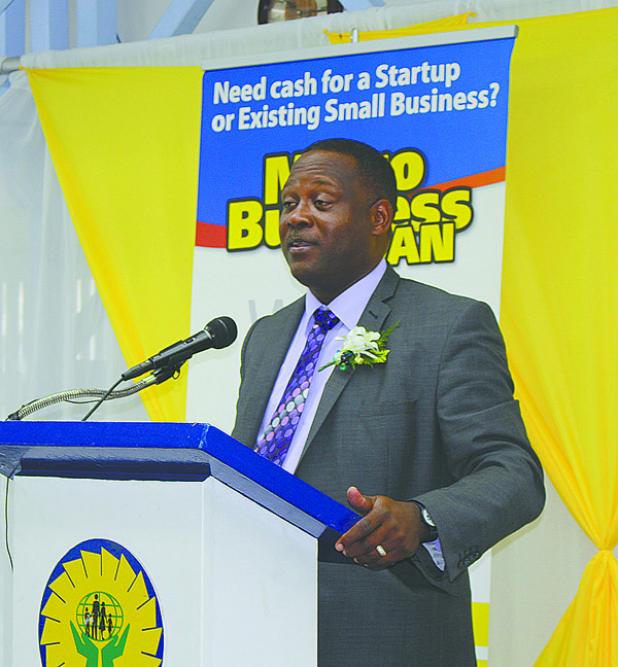Efforts are currently underway to strengthen and rebrand the Corporate Affairs and Intellectual Property Office (CAIPO).
The aim of that work, says Minister of Industry, International Business, Commerce and Small Business Development, Donville Inniss, is to make the entity more efficient and responsive as a registration department.
Speaking yesterday morning at the L.V. Harcourt Lewis Auditorium during the launch of the Barbados Public Workers’ Co-operative Credit Union Limited’s Micro Business Loan initiative for start-up and existing small businesses, he noted that the department was recently relocated to the ground floor of Baobab Tower, which should make it easier for the staff to access the basement where the records are kept.
In an interview with the media following the launch, Minister Inniss further explained that this rebranding of CAIPO is part of an overall effort by his Ministry to improve the functioning of the departments under his purview. In respect of Corporate Affairs, he said among the major goals is to improve the response times to applications and queries made to that office, to be more customer friendly, and to play a greater role in the growth and development of the economy.
“There is no doubt that it is one of those departments that comes under heavy criticism; there is not a day that passes that I don’t get a call about something regarding Corporate Affairs. On the other hand, I am very mindful of the internal challenges that they have, staffing level issues – not just in terms of quantity but quality as well... making sure we have the best fit throughout the department, but that might be a public sector challenge on the whole. We’ve had challenges in the past and even recently with technology,” he admitted.
Minister Inniss indicated that they have also made some strides, but he is adamant that there is still more work to be done. In that respect, he explained that they are examining the areas of responsibility for the Government department, to determine “where they can shed some weight”. He made the point while he hinted that some of the functions still performed by CAIPO may need to be handed over to other Government entities.
“When I speak of rebranding a department, it doesn’t mean a name change... it means projecting a different image and not just the song and dance side of it, but real change, so that within a year’s time we can say this department has far improved from what it was perhaps two years ago, and therefore, instead of having an image now of being a very challenged department, slow to respond, frustrating... then it becomes a department that is full of energy, that is being proactive, doing a very good job at regulating and a department that staff want to work in,” he stated.
Referencing the department’s efforts to offer some of its services online, he said it has been going “reasonably well under the circumstances”. While he could not speak to the exact volume of online traffic, he said from all accounts more service providers are doing business online with CAIPO, than they were doing so six months ago.
“Of course it is a work in progress. We have interruptions from time to time with the technology, like the recent move downstairs would have caused a little hiccup there, but that is being ironed out as we speak. But it has been going reasonably well, people are submitting their documents,” he said.
Inniss made the comments as he said efforts will be made to undertake a public education initiative to sensitise persons on how to use the website. (JRT)

























